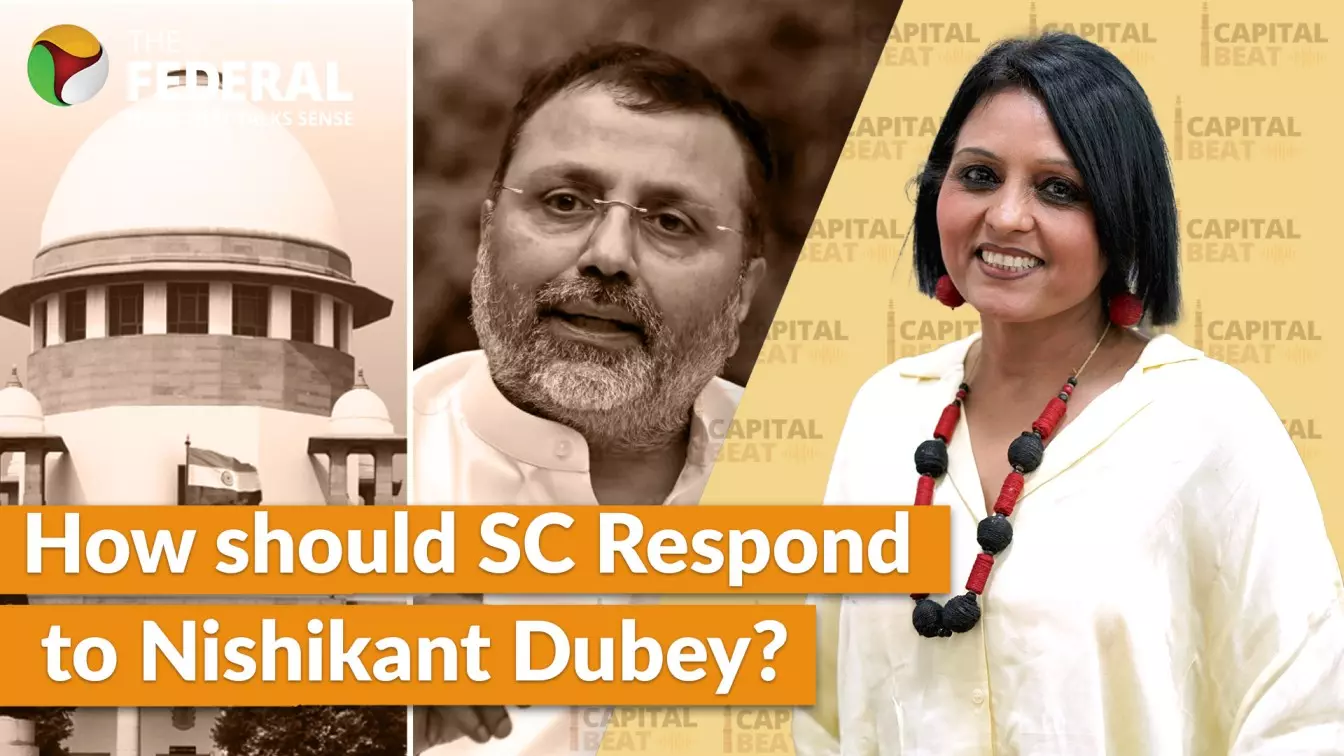
BJP MP Nishikant Dubey sparked controversy targeting the Supreme Court of India
BJP MP Nishikant Dubey vs Supreme Court: Pattern in attack on judiciary?
Should Nishikant Dubey face legal action or a censure motion for his remarks? SC lawyer Sanjay Hegde weighs in

In the latest episode of Capital Beat, host Neelu Vyas is joined by Sanjay Hegde, senior advocate at the Supreme Court of India, to unpack BJP MP Nishikant Dubey’s inflammatory remarks accusing Chief Justice Sanjiv Khanna of triggering “civil war” in the country.
The discussion dives deep into the constitutional implications, political motivations, and the chilling message such statements send to the judiciary. Hegde didn’t mince words, branding Dubey’s outburst not only “contempt of court” but “contempt of India.”
Dubey’s explosive charge
BJP MP Nishikant Dubey stirred major controversy after alleging that Chief Justice Sanjiv Khanna was responsible for “all civil wars in the country.” He also said the Parliament should shut down if the Supreme Court takes over lawmaking. A cryptic post on X and a later ANI interview saw Dubey challenge SC’s rulings on Article 377 and Section 66A, suggesting that the judiciary has overstepped its mandate.
Hegde termed the allegations deeply troubling, questioning the BJP’s internal response. “Has it proposed any disciplinary action?” he asked, adding that distancing from the remarks without consequence sends out a signal of “wink-wink, nudge-nudge” acceptance.
Constitutional ignorance
Hegde underlined that every MP swears by the Constitution and should understand its framework. “Had the MP opened it and read it, he would know about fundamental rights and judicial review,” he noted. Referring to the Kesavananda Bharati case, he reminded viewers that judicial review has been part of the basic structure since 1973.
On the role of elected representatives, he asserted, “They are not elected to be emperors… If there are doubts about what the Constitution means, the Supreme Court’s interpretation is final.”
Political orchestration?
The timing of Dubey’s comments raised questions of orchestration. Hegde speculated that the Supreme Court’s recent order on the Tamil Nadu Governor might have triggered the tirade. He also pointed to similar criticism from Vice President Jagdeep Dhankar, noting a possible pattern of institutional pressure.
Quoting a James Bond adage, Hegde remarked, “Once is happenstance. Twice is coincidence. The third time is enemy action.” He urged institutions to act collectively rather than allowing individual members to define the institution’s stance.
Implications for judiciary
Asked if Dubey’s remarks were meant to intimidate the judiciary, Hegde responded, “He may think that he can send that message, but the Supreme Court is made of sterner stuff.” He emphasized Chief Justice Khanna’s legacy, referencing his uncle Justice HR Khanna, the lone dissenter during the Emergency who defended the right to life even when it was constitutionally suspended.
Though CJI Khanna’s tenure is short—ending May 13—Hegde highlighted his balanced record, including decisions that aligned with government positions, such as on VVPAT verification.
Is there a case for contempt?
Hegde was unequivocal: “It is not only contempt of court; it is contempt of India.” He explained that the Attorney General of India, constitutionally the guardian of court contempt, can either initiate proceedings himself or grant permission to others.
He also suggested other avenues, including criminal complaints and a censure motion in Parliament. On the damage to India’s international image, he warned, “If in the international market, a parliamentarian asserts there is a civil war caused by a judge, what will the consequences be?”
Pattern of political pressure
This isn’t an isolated case, Hegde warned. The consistent targeting of judiciary—from IT cell narratives to public remarks by top BJP functionaries—points to a broader pattern. “Strong governments instinctively desire weak courts,” he said, invoking the Indira Gandhi era to contextualize current events.
He noted that such attacks may not target CJI Khanna alone but are a warning to future Chief Justices: “The chilling effect is what is being tried.”
What should the judiciary do?
On how the judiciary should respond, Hegde was measured but firm: “This has gone to a point where silence is not an option.” He acknowledged that the court may wait, but it is ultimately the judge of its own contempt. “You cannot put your head under a blanket and pretend the storm will blow over,” he concluded.
The content above has been generated using a fine-tuned AI model. To ensure accuracy, quality, and editorial integrity, we employ a Human-In-The-Loop (HITL) process. While AI assists in creating the initial draft, our experienced editorial team carefully reviews, edits, and refines the content before publication. At The Federal, we combine the efficiency of AI with the expertise of human editors to deliver reliable and insightful journalism.

